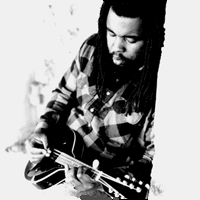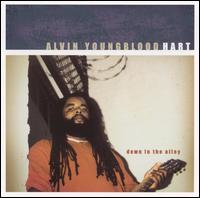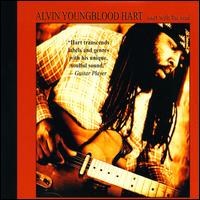

Courtesy of Alvin Youngblood Hart

Memphis International

Hannibal
A FIRESIDE
CHAT WITH ALVIN YOUNGBLOOD HART
People
tell me they hear a lot of old Taj Mahal in Alvin Youngblood Hart. I hear
more Hendrix, but then again I hear Hendrix in anyone who plays the guitar.
Chicago, by way of Oaktown, it was serendipitous that i should pick up
my first AYH record in Chitown. Called Big Mama's Door, I got it because
it reminded me of a Blood Ulmer cover. Little did I know that my shits
and giggles purchase was to park my ass on the floor. Hell of a debut
for a 33-year-old. AYH can play some blues. And everybody has the blues.
As always, the Roadshow bring it, commercial free, unedited and in his
own words.
FRED JUNG: Let's start from the beginning.
ALVIN
YOUNGBLOOD HART: I guess it was just through my parents, who listened
to a lot of music, blues and jazz and things when I was growing up. I
into the radio at a pretty early age and I have two older brothers who
were coming up in the late Sixties and got me in a lot of music that was
going on then.
FJ:
What were you listening to?
ALVIN
YOUNGBLOOD HART: Pretty much what was hip for the day, a lot of Stax and
things like that. My parents listened to a lot of B.B. King and Bobby
Bland and things like that. My brothers were into Hendrix and the Stones,
Zeppelin and things, a little bit of everything.
FJ:
You taught yourself the guitar.
ALVIN
YOUNGBLOOD HART: Yeah, pretty much. My oldest brother is a musician also,
so I guess he got the ball going with the guys behind him. My middle brother
started to play a little bit and actually, one of my uncles was sort of
influential in getting me going as far as hearing things where I wanted
to go. He came over and picked up my brother's guitar and started playing
this kind of John Lee Hooker thing. I was like ten years old when I heard
that.
FJ:
Did it come naturally to you?
ALVIN
YOUNGBLOOD HART: It was pretty easy. They say that the guitar is like
one of the most easiest instruments to fake (laughing). Look how many
people are faking on it now.
FJ:
Due in large part to you avoiding prescribed lessons, you are not limited
to the constraints that come with any formality, does that afford you
more opportunity to take chances?
ALVIN
YOUNGBLOOD HART: Yeah, I guess in some ways, but then again, in some ways,
there are constraints because you miss out on a lot of mathematical things
that are really easy, but you don't really know about it. It's like sometimes
communicating things with other musicians can be kind of weird because
of that.
FJ:
How influential was your grandmother on your journey down the blues path?
ALVIN
YOUNGBLOOD HART: It wasn't so much a musical thing. It was just kind of
an eye-opening thing culturally. I went there for the first time in 1966
when I was three and I was just kind of blown away that they were living
life in the nineteenth century as far as not a lot of modern conveniences,
no running water, all that kind of thing. A lot of people were still riding
around on horses and things like that.
FJ:
That instills a humility that is strikingly lacking in this day and age.
ALVIN
YOUNGBLOOD HART: Oh, well, I was so young at the time when I was first
there and for me, it was great. My grandma made it as if it was always
going to be my home so I was glad to be a part of it. I was able to see
things that most people my age are never going to see.
FJ:
You did a tour in the Coast Guard, long way from the blues.
ALVIN
YOUNGBLOOD HART: Well, it was really a lot of fun, mixed up with sometimes
hard labor. It was a steady paycheck. For me to stay in there for seven
years, I must have been able to avoid a lot of the serious, military type
aspect of it (laughing). Most of my time there was just concentrating
on work. The first three and a half years, I was on a buoy boat on the
Mississippi River, which was quite an experience. You get to work on the
river, something I always wanted to do since I was a little kid. That
was a thing where we were kind of isolated just away from whatever was
going on in the real Coast Guard. Basically, we just worked on maintaining
our navigational channels. That was pretty much the routine for about
three and a half years. Whatever we had to do for that, mostly it was
like cutting trees and setting buoys in line at the bends in the river
and we built these light towers on the river banks and kept them going
and things like that. And then I went to Coast Guard Electronics School
in New York City for like four months. It was like this accelerated electronics
program. I got out of that and I was sent out to the West Coast to a radio
transmitter station about forty miles north of San Francisco. There I
remained for the next three and a half years and worked on these radio
transmitters. On my off days, I would be over in Berkeley and San Francisco
kind of messing around with music and things.
FJ:
Joe Louis Walker played a role at the beginning of your career.
ALVIN
YOUNGBLOOD HART: We met at a guitar store, this really sort of unique
guitar store that we used to hang out at and we sat in there one day for
a couple of hours after the place closed and played in there and swapped
phone numbers and he would do some stripped down gigs where it would be
him and a bass player, standup bass player and he might have me in on
another guitar. He called me up for things like that every now and then
or he would do solo gigs where he would call me in and do that gig with
him and stuff. It kind of got my foot in the door in the Bay Area anyway.
FJ:
Let's touch on your debut, Big Mama's Door.
ALVIN
YOUNGBLOOD HART: It would have been nicer for me just to have more control
over the sound of a record, just things I really don't like, to hear the
sound of the instruments more than mine, it was very difficult to communicate
with the engineer, who was into a whole other school or whatever and not
really in tune with what I was doing. The instruments that we used on
there, my wife and myself kind of rebuilt from splinters and things from
the Twenties and Thirties and things that we think had a very unique sound
that we wanted to try and capture on there. We weren't really able to,
so that is my thing with that record.
FJ:
And you followed that with the Down Beat Critics Poll winning Territory.
ALVIN
YOUNGBLOOD HART: It was kind of fun to make. I just had the idea after
kind of hanging around with a person like "Gatemouth" Brown
for the last few years on and off, that I wasn't going to try and follow
any particular style thing and was going to try to avoid barriers and
communicate what I want to communicate musically with that record. I guess
it sort of worked. I don't know. A lot of people didn't get.
FJ:
A lot of people tend to not get a lot of things.
ALVIN
YOUNGBLOOD HART: (Laughing) Yeah, oh, yeah, sure. I guess I can't let
it bother me. I've got to do what I've got to do.
FJ:
And your latest release, Start with the Soul.
ALVIN
YOUNGBLOOD HART: I recorded it back in August '99, somewhere around there.
FJ:
East Memphis Slim, not to be confused with Memphis Slim, appears on a
few cuts.
ALVIN
YOUNGBLOOD HART: That is Jim Dickinson's pseudonym. I had a good time
with him in there. I could make a career out of just hanging out and making
records with him.
FJ:
Your approach to the blues is to combine a lot of the influences and elements
you have witnessed in your life. Aren't you concerned that because you
don't take the traditional blues approach that die hards may be turned
off?
ALVIN
YOUNGBLOOD HART: No, because it's not like they know anything about what
they are talking about anyway (laughing). It comes down to playing the
real traditional country blues, see, I've gotten to the point where I
can really do that blindfolded and play circles around most of these other
guys with that particular style. After so many years, I was just getting
burned out on it. I made a conscious decision in 1984 to that kind of
solo blues thing and just forget about everything else at that time. I
sold some now really valuable electric guitars so I could finance these
really cool acoustic guitars and things and concentrate on that until
something finally happened with it twelve years later. By that time, it
had kind of turned into something different and I don't know if I wanted
to be associated with the whole thing.
FJ:
You'd rather be on the outside looking in.
ALVIN
YOUNGBLOOD HART: Sure, that's a good way to put it I guess.
FJ:
What is the one thing you do well?
ALVIN
YOUNGBLOOD HART: Boy, I don't know. I try to do everything that I do well
just as a matter of, so when I have done something I can look back and
say that I have done a pretty good job on this or whatever. As far as
just about anything, the things I like to do are working on my electronics
a lot and my instruments and things, cooking, all kind of things like
that. I'm big into hunting and fishing. My whole existence kind of revolves
around those things.
FJ:
As a fisherman, what is your biggest catch?
ALVIN
YOUNGBLOOD HART: I guess I caught a seven and a half pound large mouth
bass. I was bass fishing in Mississippi. My parents have a small lake
behind the house. There is a lot of them in there. Over the years, I have
caught a lot of very big ones out there like eighteen, nineteen inches.
FJ:
Do you still play your 12-string Stella?
ALVIN
YOUNGBLOOD HART: Yeah.
FJ:
What is the difference between a 12-string and the normal 6-string outside
of six more strings?
ALVIN
YOUNGBLOOD HART: Well, there is different schools of thought on that whole
thing. In the early twentieth century, it was a big facet in Mexico and
it sort of made its way on up. Leadbelly's niece told us that is probably
where Lead got it from. He probably saw a Mexican 12-string guitar player
working out and he was kind of blown away by that thing. There are certain
ways of stringing it and tuning that you have got to do that is like a
baritone low tune thing. That is what Leadbelly kind of picked up on and
blew everybody away with, blew me away with anyway. It got me going on
that, which nobody knows anything about it. It totally goes over most
people's heads. I guess their idea of what a 12-string is open to interpretation.
There are people who string it totally different. I, myself, was taught
to follow in that Leadbelly vein.
FJ:
Is that your axe of choice?
ALVIN
YOUNGBLOOD HART: Yeah, it is sort of one of the things that I try to specialize
in. I have fifty axes of choice to choose from (laughing). I have just
learned to pick through it and find every instrument's unique character.
FJ:
There is an interesting origin to your name, Alvin.
ALVIN
YOUNGBLOOD HART: Well, the real thing was that I used to wear a baseball
hat with an "A" on there. Some friends of mine just kind of
started up in a derogatory way about the cartoon.
FJ:
You are referring to the beloved Chipmunk cartoon.
ALVIN
YOUNGBLOOD HART: Yeah, then it kind of stuck for a while because I used
to have a Gibson 335 guitar and then they were messing with me about Alvin
Lee. He used to play that.
FJ:
So you never found your way out.
ALVIN
YOUNGBLOOD HART: Yeah, right (laughing).
FJ:
And the future?
ALVIN
YOUNGBLOOD HART: I will probably just keep touring. This summer gets pretty
full. I have been touring most of the year except I try to take off in
December to hang out with my parents and my family.
FJ:
Do you have kids?
ALVIN
YOUNGBLOOD HART: Yeah, I have one son who is three years old.
FJ:
Must be tough being away from him on the road.
ALVIN
YOUNGBLOOD HART: Well, my family goes on the road most of the time anyway,
so it is not so bad.
Fred Jung is the Editor-In-Chief and is doin big pimpin, spendin cheese,
big pimpin on B.L.A.D.s.
Comments? Email Him